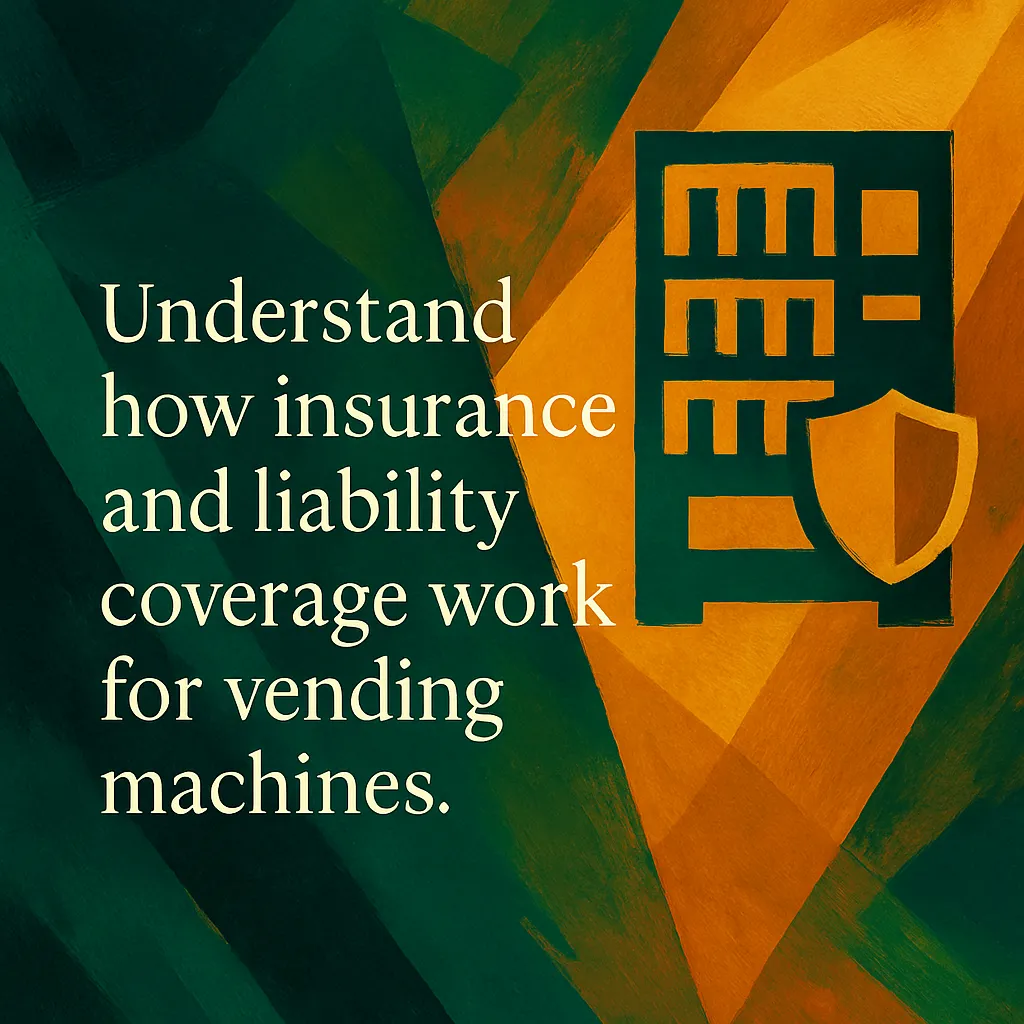Do Vending Machines Need Insurance?
Understand how insurance and liability coverage work for vending machines.
Back to Vending FAQs ResourcesUnderstand how insurance and liability coverage work for vending machines.
Back to Vending FAQs ResourcesWhether you own a single machine or manage a fleet, proper insurance coverage is crucial for mitigating risks and safeguarding your assets and reputation.
![]() Comprehensive coverage protects against theft, damage, and liability claims
Comprehensive coverage protects against theft, damage, and liability claims
![]() Ensures business continuity and financial stability
Ensures business continuity and financial stability
![]() Provides peace of mind for both machine owners and location hosts
Provides peace of mind for both machine owners and location hosts

Operating vending machines, whether as a primary business or as an added amenity, involves a range of potential risks. From mechanical failures to product recalls, and even customer injuries, the unexpected can happen. This is why the question, "Do vending machines need insurance?" is critical for anyone involved in unattended retail. While specific legal requirements can vary by location and type of operation, having appropriate insurance is almost always a wise decision to protect your assets and liabilities.
The primary types of insurance relevant to vending machines include General Liability, Product Liability, and property insurance. General Liability insurance covers claims of bodily injury or property damage that occur at the location where your machine is placed. For example, if a customer slips and falls near your machine, or if the machine somehow damages the premise, general liability can cover the associated costs. This is particularly important for businesses hosting machines, as it helps define who is responsible in such events. To ensure clarity on responsibilities, it's beneficial to review documentation like questions to ask before signing a vending contract.
Product Liability insurance is another non-negotiable for vending machine operators. This coverage protects against claims arising from defective products sold through the machine. Imagine a scenario where a beverage dispensed from your machine causes an allergic reaction due to incorrect labeling, or a snack machine sells expired food leading to illness. Product liability insurance would cover legal fees, medical expenses, and settlements related to such incidents. For a deeper dive into the terms that define liability, you might find insight in articles discussing liability and insurance in vending contracts.
Beyond liability, property insurance is crucial for safeguarding the vending machines themselves. These machines represent a significant investment, and they are susceptible to various perils including theft, vandalism, fire, or accidental damage. Property insurance helps cover the cost of repairing or replacing a machine if it's damaged or stolen, ensuring business continuity without severe financial strain. Understanding the full scope of various agreements, including how property and liability are managed, can be found in resources like understanding vending service contracts.
The extent and type of insurance needed can also depend on whether you own and operate the machines yourself, or if you're a business hosting machines owned by a third-party vendor. If you're an operator, you'll need comprehensive coverage. If you're a host, you typically rely on the vendor's insurance, but it's essential to confirm that they have adequate coverage and that your location is listed as an additional insured on their general liability policy. Regular review of these policies and clear communication with your insurance provider are key to effective risk management in the vending industry.
While not always legally mandated by state or federal law for every vending machine, it is highly recommended to protect against potential liabilities.
Key types include General Liability, Product Liability, and Property Insurance, though specific needs vary based on ownership and location.
Yes, General Liability typically covers bodily injury or property damage that occurs on the premises where the vending machine is located, such as a customer tripping over it.
Product Liability protects against claims arising from defective products sold, such as food poisoning or allergic reactions due to mislabeled items.
If a third-party vendor manages the machines, their insurance usually covers primary liability. However, locations often require the vendor to list them as an additional insured.
Risks include theft or vandalism of the machine, electrical malfunctions causing damage, customer injuries, and product-related health issues.
Property insurance is crucial here, covering the cost to repair or replace machines damaged by vandalism or stolen from the location.
Yes, machines selling perishable goods have higher product liability risks due to potential spoilage. Robust product liability coverage and strict inventory management are essential.
While the vendor should have primary coverage, the host business's general liability policy might offer secondary protection. It's best to review agreements and ensure adequate coverage from both parties.
Policies should be reviewed annually or whenever there are significant changes to operations, such as adding new machines, changing locations, or altering product offerings.